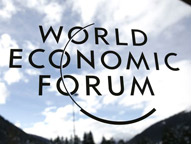|
World Economic Forum:
Global warming, a more pressing issue
 The Prime Minister of Japan, Shinzo Abe, spoke about the sour
relations between his government and the communist regime in China. The Prime Minister of Japan, Shinzo Abe, spoke about the sour
relations between his government and the communist regime in China.
This was supposed to be the return to normal Davos. After all the
years living in the shadow of the crisis, the World Economic Forum of
2014 was billed as the one that looked forward to the future not the
past.
The trouble is that the past doesn't seem to go away. There was the
run on the Argentine peso that rekindled memories of the market crises
of the 1990s.
There was the warning from Al Gore and Nick Stern, among many, that
global warming was a more pressing issue now than it was before the
financial crisis pushed climate change down the to-do lists of policy
makers. There was the frightening comparison made by Japan's Prime
Minister, Shinzo Abe, that the sour relations between his government and
the communist regime in China had parallels with the Anglo-German
tension in the run up to the outbreak of war in 1914.
A military clash between Asia's two biggest economies is still seen
as inconceivable, but even if it continues to be jaw-jaw rather than
war-war in the Eastern Pacific the parallel drawn by Abe is relevant for
three reasons.
The first is that changes in the global balance of power cause
instability as countries on the rise flex their muscles and countries on
the wane seek to maintain their influence.
One such period was the quarter-century from 1890 onwards, which saw
the rise of Germany and the US.
Another has been the collapse of the old bipolar cold war world and
the emergence of China as an economic superpower since 1989.
Second, these periods of change can go on for a long time.
It took 30 years for stability to return after 1914, a period that
included two world wars, the rise of totalitarianism and the great
depression.
Finally, as Mark Carney said in Davos last week, mismanagement of
economic shocks can delay the impact of technological breakthroughs.
There was plenty of evidence in Davos that innovation has not ceased
while the crisis has been raging.
Ideas abound, in areas such as the life sciences, with the potential
to transform economies and dispel the fears of the former US Treasury
Secretary, Larry Summers, that this is an age of secular stagnation. But
they will only flourish in the right climate.
The final day of the World Economic Forum traditionally includes a
roundtable on the state of the global economy, chaired by the Financial
Times' chief economics commentator, Martin Wolf.
This year's session was less good than usual, largely because the
panel had too many people on it (the seven-strong cast list included the
IMF chief, Christine Lagarde; the Bank of England Governor, Mark Carney;
the President of the European Central Bank, Mario Draghi; the Bank of
Japan governor, Haruhiko Kuroda; and the German Finance Minister,
Wolfgang Schäuble), resulting in none of them being able to say much.
It was also clear, though, that Lagarde and Draghi are fumbling
around in the dark. Wolf described the mood as cautiously optimistic,
which is a bit like him (uncharacteristically) ending a piece with the
phrase time will tell. Cautiously optimistic and time will tell are just
polite ways of saying I haven't got a clue.
In the short run, the prospects for growth are better than what
people think.
There's the potential for trouble in emerging markets but the
response will be to keep economic policies looser for longer than it
otherwise would have been. The Fed will slow down the gradual withdrawal
of its policy stimulus, the Bank of Japan will step up its quantitative
easing program, and the ECB will ease policy to counter the threat of
deflation.
Carney had a difficult week trying to explain what Threadneedle
Street's forward guidance on interest rates now meant following the
sharper than expected fall in unemployment. He insisted nothing had
really changed: borrowing costs will remain low.
But as to the shape that forward guidance will take, that's a
different matter. Will the Bank of England lower the threshold at which
it starts discussing interest rate rises from an unemployment rate of 7%
to a lower figure? Will it chose another economic variable - such as the
growth in output or wages - to replace unemployment? Will it simply say
the interest rates will stay low for a set period of time unless
inflation picks up?
Carney needs to come up with an answer in the next two weeks. At
present, it is a case of time will tell.
But for businesses and households in advanced countries thinking
about borrowing money, the question is whether a tightening of policy is
imminent and there is no sign that it is. In the UK, this sort of
environment could easily prompt a long-awaited pick-up of investment
during 2014, leading to further upward revisions to growth forecasts.
|

